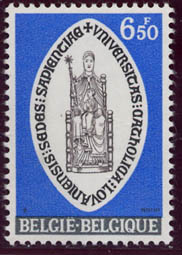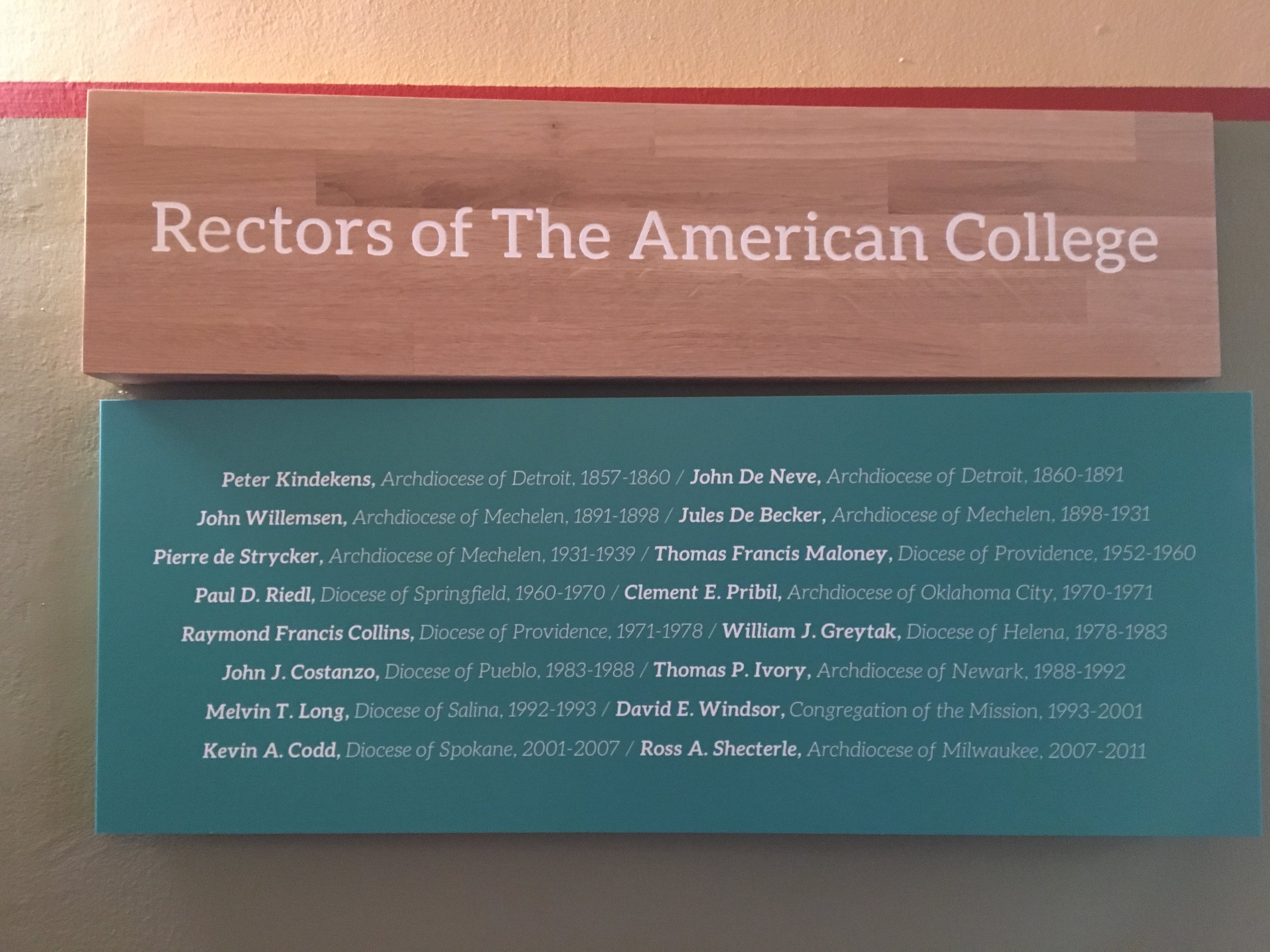History leading up to the ACAA
The Catholic University of Louvain
1425 University of Louvain founded by Pope Martin V
1432 Faculty of Theology established
1517 Erasmus of Rotterdam establishes his Collegium Trilingue at Louvain for the study of Latin, Greek and Hebrew
1522 Adriann Florenszoon Boeyens becomes Pope Adrian VI (studied, taught and served as Rector at Louvain)
1545 Louvain theologians active at Council of Trent
1570 Prof. Justus Lipsius of Louvain develops modern textual criticism
1963 Louvain provides more periti for Vatican II than any other university in the world Professor Gerard Philips a major participant in formulation of Lumen Gentium
The American College
(information in process subject to edit)
1856 Archbishop Francis Kenrick (Baltimore, MD) sends Fr. Peter Kindekens (Detroit) to Rome to establish an American College there, but the project is abandoned; he stops in Louvain to find that the Belgian bishops and the Rector of the university would welcome an American College
1857 American bishops approve, and Fr. Kindekens returns to Louvain as first Rector of the American College of the Immaculate Conception on March 19, 1857, the Feast of Saint Joseph
1907 By the 50th anniversary of the A.C. there are 120 students and the college enjoys strong support from bishops and the blessing of Pope Pius X
1914 World War I – University of Louvain suspends classes; American College buildings used as Red Cross station
1939 American College closed on eve of World War II; used to store university library
1952 American College reopens with Rector Fr. Thomas Maloney (Providence, RI) who eventually is named a Bishop.
1965 Under Rector Msgr. Paul Reidl (Springfield, MA) the American College has 114 students from 26 diocese enrolled. Our Lady of Mercy Parish in Brussels established for English speaking Catholics with Albion Bulger as the first pastor
1966 36 dioceses assign seminarians to American College
1967 Louvain Studies begins publication
1968 the university is split in two: Katholieke Universiteit Leuven (K.U.L) and Universite Catholique de Louvain; K.U.L. begins offering courses in English with the agreement that The College remain in Leuven.
1969 Christiane Brusselmans joins the faculty of the K.U.L.
1970 Fr. Clement Pribil becomes interim Rector. During his tenure, albeit brief, he manage to involve both seminary staff (faculty) and students in a joint long-range planning project to address the changing environment of seminary formation.
1970 – 1990 The College continued to prosper under the leadership of several fine rectors: Fr. Raymond Collins (AC ’59), a Professor in the Faculty of Theology, Rector from 1971-1978, Fr. William Greytak (AC ’56) Rector from 1978-1983, and Fr. John Costanzo (AC ’64) Rector from 1983-1988, each of whom worked diligently to maintain The College and increase the population of all programs while fostering a continued relationship with the Faculties of the University.
1973 Fr. Mel Long joins Formation Faculty (Staff) as director of Pastoral Formation, a position he holds for five years. During his tenure The Summer Sessions begins and becomes very popular, running until the closing of The College in 2011. He later returns as acting Rector holding The College on a steady course.
1983 Fr. John Costanzo from Pueblo Colorado becomes Rector. During his tenure a capital campaign was started and a building renovation began adding student rooms (double suites) on the fifth floor along with much needed repairs on older part of the building. Rector Costanzo was in office when the De Rance Grant was proposed below.
1989 Major remodel is undertaken in The College adding loft rooms for seminarians, new lighting for the chapel, and new heating system for the entire plant (with the exception of the chapel which retained the old boiler). The Higher Institute of Philosophy celebrates 100 years with a symposium sponsored by the De Rance foundation of Milwaukee. Fr. David Boileau had intended the funds to support the Alumni Association of the Higher Institute of Philosophy, but through the work of Bishop Richard Sklba of Milwaukee, the De Rance foundation gifted The College with one million dollars in four segments for the symposium and philosophy scholarships. These funds supported many students from various American and Canadian dioceses through the 1990's, including Chicago, Anchorage, and Orange. Over one million was given in scholarships during the next ten years.
Fr. Tom Ivory, the new Rector, completes the project and invites Fr. Mel Long, a former faculty member, to staff the new Development office in Washington as Executive Vice-President for recruitment of seminarians and as Development Director. Fr. Ivory had served as spiritual director at The College from 1969 to 1974. He holds his Doctorate from Louvain. During his tenure as Rector, he also served as an Adjunct Professor in the Faculty of Theology.
1990 Development office opens in Washington DC at the National Conference of Catholic Bishops. Fr. Mel Long named Director of Development and sets out almost immediately to found an American Advisory Board to help promote The College and its mission.
1991 Seminary student body begins to diminish while other programs remain very successful; i.e., Graduate, Sabbatical, and Summer. Fr. Mel Long asked to step into the Rector’s office as Acting Rector, upon the resignation of Fr. Tom Ivory, while the Bishops launch a search committee. Fr. Mel worked three weeks in Louvain and one week in Washington each month while holding these two offices.
1992 Fr. Long celebrates the life and works of the European Advisory Board for The College with a closing ceremony and banquet.
1993 Fr. Long returns to Washington as new Rector is named. Fr. Mel along with Mr. Mike Mintern establish The American College Advisory Board with its first meeting in June of this year in New Orleans. They quickly took on advising the Rector on financial matters.
1993 Fr. David Windsor is named Rector and served in that post until 2001, then undertaking the role of Development Officer until 2003.
1994 Under the encouragement of the then Dean of the Canon Law Faculty, Prof. Dr. Torfs, a concerted effort was made to increase the graduate program in canon law. This year twelve new canon law students, sisters and priests, arrived at The College.
1995 The financial life of The College was improved by starting The American College Endowment using the funds from the old Villa sold some years earlier. The De Rance funds were removed from general monies and placed in the De Rance Fund. Both endowments were restricted by Rector Windsor and his administration. The College also engaged a full time broker to manage the college portfolio and the funds were returned to the United States at the advice of the Advisory Board where they were overseen by the Board’s investment committee. Monsignor John Scanlan takes over the duties of the Washington office as Fr. Mel returns to his diocese having finished his term. Clear glass windows were place over the stained glass windows in the chapel to protect the historic works of art. A philosophy prefect was named to oversee the new philosophy scholars arriving as part of the De Rance Scholarship program.
1997 Telephones were placed in each room and in each office, and through the generosity of the Catholic Daughters of the Americas; a new computer centre was established giving The College its own servers, website, and email system: acl.be. Three quarters of the windows were replaced by dual pane windows and the fourth floor was refurbished to accommodate the increase of new “scholars” as the philosophy students were named.
1998 The Advisory Board launches a capital campaign with a three million dollar goal.
2000 Monsignor John Scanlan, Director of Development (known as Mr. Louvain), dies on Christmas morning.
2001 Fr. Kevin Codd named Rector while Rector Windsor, named Rector Emeritus by the Bishops’ Committee, moves to Washington DC to oversee the development office.
2001 – 2007 Many improvements made during Rector Codd’s tenure at The College including a new heating system for the chapel with a new tile floor and many other improvements to the fabric of the place.
2007 Under Rector Codd’s supervision, a grand 150th anniversary celebration is held with Mass at Saint Peter’s Church, a sterling reception by the City of Leuven at the Stadhuis, a never to be forgotten banquet at The College itself, with many other celebrations in and outside Leuven. Most members of The American Advisory Board were present along with several Bishops and Cardinal Levada who preached the anniversary Mass.
2007 Monsignor Ross Shecterle is named 16th Rector of The College and Fr. Kevin Codd is named Monsignor.
2011 The College closes after 154 years.
Rectors of the American College
1857 – 1869, Peter Kindekens (Detroit)
1860 – 1891, John DeNeve (Detroit)
1891 – 1898, John Willemsen (Mechlin)
1898 – 1931, Jules De Becker (Mechlin)
1931 – 1939, Pierre de Stryker (Mechlin)
1952 – 1960, Thomas Maloney (Providence)
1960 – 1970, Paul Reidl (Springfield)
1970 – 1971, Clement Pribil (Oklahoma City)
1971 – 1978, Raymond Collins (Providence)
1978 – 1983, William Greytak (Helena)
1983 – 1988, John Costanzo (Pueblo)
1988 – 1992, Thomas Ivory (Newark)
1992 – 1993, Melvin Long (Salina)
1993 – 2001, David Windsor (CM Milwaukee)
2001 – 2007, Kevin Codd (Spokane)
2007 – 2011, Ross Shecterle (Milwaukee)
The Saint Damein Project/Community
2013 The Saint Damein Project begins as a joint effort keeping the window of Northern Europe open to lay students, alumni, and clergy on sabbatical that desire to study theology, philosophy, and canon law. Renovations of the American College begin to support this effort.
2014 The doors of the American College reopen to Students and Researchers from North American in September 2014 under the newly formed Saint Damien community. The focus of the community is lay students and graduate priests studying theology, canon law, and philosophy.




